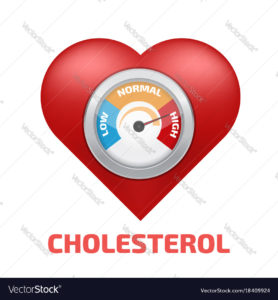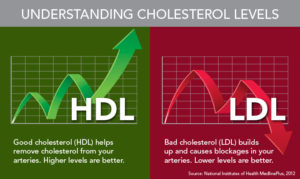What is cholesterol?
Cholesterol forms in the liver but we also get cholesterol through foods we eat too. It is a waxy substance that has many important functions in the body. It is part of various hormones, the makeup of the walls of your body’s cells, a component of bile, and many other purposes. How the body processes it is very complex. It joins with a protein and forms a package called lipoprotein. These lipoproteins carry cholesterol through the blood.
What is the functions of cholesterol in the body?
- It aids in the production of sex hormones.
- It’s a building block for human tissues.
- It assists in bile production in the liver.
-
Its main function is to maintain the integrity and fluidity of cell membranes. Cholesterol helps to regulate membrane fluidity over the range of physiological temperatures. to serve as a precursor for the synthesis of substances that are vital for the organism including steroid hormones, bile acids, and vitamin D.
How is cholesterol measured?
Cholesterol is measured in metric system units. The LDL’s (low density lipoproteins) have the bad cholesterol. LDL’s are the main source of blockage in the arteries. HDL’s (high density lipoproteins) have the good cholesterol. HDL’s help keep cholesterol from building up in the wall of the arteries. Which most foods show on their labels how much LDL and HDL cholesterol is in a serving of the food your buying. If it doesnt’t show the cholesterol levels on the label than don’t buy it unless its a treat once in awhile.
Through Cleveland Clinic they state the normal levels of cholesterol for total. HDL and LDL should be:
A HDL level for women 20 yrs old or higher should be 50mg/dl or greater.
A HDL level for men at 20 years old or older should be 40mg/dl or greater.
A LDL level for women or men at 20 years old or older should be less than 100mg/dl.
A total cholesterol level less than 200mg/dl is considered good. It represents the least risk of heart disease. Above that, your level is borderline high. If you are above 200 your level of cholesterol is high.
In our body we have cholesterol which is a type of fat. In certain foods is cholesterol depending on the food you buy. Your total cholesterol includes LDL (low-density lipoprotein) and HDL (high density lipoprotein) cholesterol. Let’s differentiate the two:
1. LDL (low density lipoprotein) the bad cholesterol can build up in the arterial walls and form plaque in time. What does this mean?
That build up in the arteries will reduce blood flow and increase your risk to heart disease, especially eating frequently the wrong foods with high and bad cholesterol over years (Example. coronary artery disease, high blood pressure, and eating like this for years can lead to a heart attack or from s/s arising scarring the person to go to the doctor and find out they have blockages & need surgery. The sign and symptoms arising scarring the person can range from chest pain, and can be radiating down the arms, sweating profusely, weakness/fatigue increases in your life, dizziness, you feel like you’re going to fall or actually due to the fatigue/weakness=low blood pressure due to the blockage or the heart just working too hard in doing its function since the cardiac output is decreased from the blockage) Take one of my dear friends who I have known almost 40 years who was a workaholic 10to14hr/7 days a week for at least 35 years and 2 years ago he had to undergo surgery for a coronary artery blockage bypass for 5 vessels blocked 80% to 100%. He should have been dead already due to a heart attach for such blockage but had a successful bypass done followed by long rehab and got better due to high cholesterol eating, smoking (that both play an impact in plaque & tar build up in the vessels) and he stopped but he also was obese by about 50lbs. and lost 30lbs due to better eating and less beer. This could have been prevented if he changed his diet, watched his weight, and quit smoking years ago but that takes discipline, making sacrifices is all within your hands to allow for healthy habits now (prevention) or later when problems occur (treatment), if caught in time. There is a way out of this happening to you.
2-HDL (high density lipoprotein) the good cholesterol it’s known as. What does this mean?
Because it is thought to help remove bad cholesterol from the body; if you decide the right foods in the right portions that will have more HDL than LDL in them. Differentiating the 2, now another component to keep in mind is risk factors that can put you at risk for heart disease and your doctor will determine what additional risk factors you have putting you at risk for heart disease. These risk factors can be modifiable (controllable by individuals) or non-modifiable (non-controllable by individuals). Stayed tune for Part II on cholesterol tomorrow covering all this!

